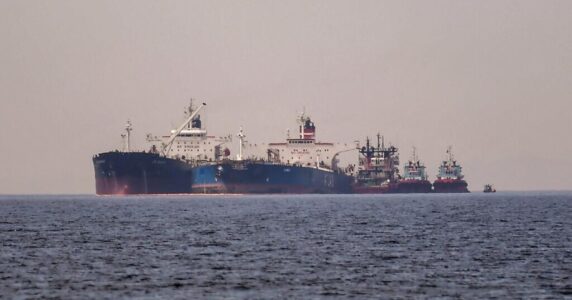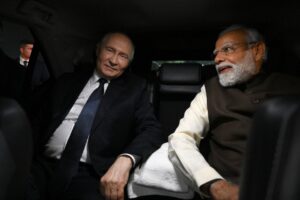
The imposition of international sanctions against the Russian Federation for its aggression against Ukraine forced the Kremlin to seek ways to circumvent them. An important instrument became the so-called shadow fleet. These are hundreds of vessels registered in third countries that transport Russian oil products to India, China, and other markets. According to estimates by the analytical company S&P Global, based on OSINT data, as of early 2025, Russia’s shadow fleet consisted of 940 tankers, representing 17% of the global fleet of vessels of this type. According to S&P, the shadow fleet transports 80% of Russian oil exports while circumventing sanctions. The Center for Strategic Communications and Information Security analyzed the Kremlin’s information strategy regarding the shadow fleet and potential directions for its development and associated risks.
“Western Fakes” and “Independent Logistics”: The Shadow Fleet in Official Rhetoric
The actions of Russian state and Kremlin-controlled media, as well as government representatives, are aimed at minimizing the presence of the shadow fleet topic in the Russian media space. At the same time, the topic is used to discredit international sanctions.
The Kremlin’s official rhetoric and publications in Russian state media present the shadow fleet either as another “anti-Russian fabrication” and Western “fake,” or as an “independent logistics system” for transporting energy resources.
On June 17, 2025, RIA Novosti published an interview with Russia’s Ambassador to Denmark, Vladimir Barbin, in which he called actions to enforce the sanctions regime “attempts at piracy” and promised they would be “severely suppressed.”
On October 2, 2025, Russian Foreign Ministry spokesperson Maria Zakharova stated that “the EU invented the non-existent concept of a shadow fleet” and called the sanctions “unlawful.”
On October 2, Kremlin spokesman Dmitry Peskov announced readiness to “take measures” and warned of risks of “unpredictable consequences for global energy markets.”
The issue is most actively covered in publications such as Izvestia (monitoring tools indexed 140 publications since the beginning of 2025 mentioning the term “shadow fleet”), Inosmi (15 publications), Kommersant (9 publications), TASS, EADaily (6 publications each), Neftegaz.ru, Komsomolskaya Pravda, RBC (4 publications each).
Intensity of use of the term “shadow fleet” in Russian media and social networks in 2025
Monitoring tools indexed 1,700 publications in the Russian segment of social networks and Russian media mentioning the term “shadow fleet.” The total reach of publications is 8.5 million views. Most mentions are reactions to the introduction or announcement of international sanctions against the shadow fleet and/or republications of materials from foreign media.
Recommendations for circumventing international sanctions are provided by Russian academics. In particular, as early as 2022, the scientific publication “Bulletin of Research Results” published an article by Oksana Pokrovskaya, associate professor at the Petersburg State Transport University, titled “Russian Logistics System’s Responses to Western Sanctions Challenges: Circumvention or Mitigation”. The article does not use the term “shadow fleet,” but describes in considerable detail some schemes for circumventing Western sanctions through third countries, and provides forecasts and recommendations for increasing the effectiveness of such actions.
Key Narratives and Manipulations
Government representatives and state media simultaneously promote several parallel narratives and use manipulative techniques aimed at shifting focus when covering the shadow fleet problem. Specifically:
The Kremlin officially does not recognize the existence of the shadow fleet while simultaneously informally acknowledging the presence of “alternative” logistics mechanisms in the Russian Federation, resorting to bureaucratization of rhetoric (active use of euphemisms and professional terminology is a component of Putinian newspeak);
International sanctions are presented as illegal and aimed at “economic enslavement of Russia” as part of a conspiracy by globalists/Western governments/transnational corporations (strengthening general anti-Western, anti-European, and anti-globalist narratives, including the message “sanctions pose a threat to global energy security”);
The conflict around the shadow fleet is reduced to the legal sphere (accusations that the EU violates international law and the principles of free navigation);
The Russian Foreign Ministry, the Kremlin, and other official structures periodically broadcast “forceful” rhetoric (narrative about protecting sovereignty, threats to “take measures” that will lead to “unpredictable consequences”);
Manipulations around environmental risks and shifting responsibility for them onto countries imposing sanctions are common.
Among the messages of Russian propaganda, the following can be identified:
“Russia is protecting its own sovereignty and global energy security from Western/globalist encroachment”;
“Sanctions against the shadow fleet pose a threat to global environmental security” (including accusations of Ukraine and Western intelligence services of sabotage and hybrid aggression);
“Sanctions against the shadow fleet are not related to aggression against Ukraine; their goal is to monopolize markets and establish Western/globalist energy dictate.”
Given this, there are risks of integrating the mentioned messages into general anti-globalist (anti-Western, postcolonial) narratives popular in the West and Global South countries. There is also the risk of integrating Russian manipulations into environmental narratives, which are an important component of political discourse in Western countries.
If you have found a spelling error, please, notify us by selecting that text and pressing Ctrl+Enter.





